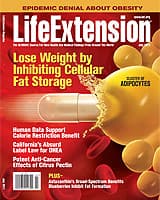| The New England Journal of Medicine published several studies in the year 2000 showing that the blood indicators of inflammation are strong predictive factors for determining who will suffer a heart attack (Lindahl et al. 2000; Packard et al. 2000; Rader 2000). The January 2001 issue of Life Extension Magazine described these studies and explained how individuals could protect themselves against these inflammatory markers (such as C-reactive protein, homocysteine, and fibrinogen). A growing consensus among scientists is that common disorders such as atherosclerosis, colon cancer, and Alzheimer's disease are all caused in part by a chronic inflammatory syndrome. For those who have multiple degenerative diseases, the cytokine profile blood test and the C-reactive protein blood test are highly recommended. This may be done through your own physician or the Life Extension Foundation. If your cytokine test reveals excess levels of cytokines such as TNF-a, IL-1(b), or both, nutritional supplementation, dietary modifications, and low-cost prescription medications such as PTX are advised. The following nutrients are suggested: - The docosahexaenoic acid (DHA) fraction of fish oil may be the most effective nonprescription nutrient to suppress pro-inflammatory cytokines. Gamma-linolenic acid (GLA) is a precursor of PGE1, a potent anti-inflammatory agent.
- DHEA is a hormone that decreases with age. DHEA has been shown to suppress IL-6, an inflammatory cytokine that often increases as people age. Typical doses of DHEA are 25-50 mg daily, although some people take 100 mg daily.
- Nettle leaf has been shown to suppress the proinflammatory cytokine TNF-a. Take 1000 mg daily.
- Vitamin E and N-acetyl-cysteine (NAC) are protective antioxidants with anti-inflammatory properties. Vitamin E that contains gamma-tocopherol and tocotrienols provides the most broad-spectrum protection. NAC is an amino acid with antiviral and liver protectant properties. Six hundred milligrams daily is recommended.
- Vitamin K helps reduce levels of IL-6, a pro-inflammatory messenger. Vitamin K also helps in the treatment of osteoporosis by regulating calcium and promoting bone calcification. If you are taking Coumadin or other anticoagulant medicine, consult your physician before taking vitamin K.
- Consuming at least 1000 mg per day of carnosine and/or 300 mg of the European drug aminoguanidine can inhibit pathological glycation reactions in the body.
| Life Extension Magazine® July, 2011 Now Available in Electronic Format 
This e-issue of Life Extension Magazine® is extraordinarily easy to use, easy to navigate … with the same flip-the-page feeling you get from your printed copy, plus a few extra advantages. You can choose to search out a topic or keyword. Skim quickly. Skip ahead. Even order products. Shed pounds by inhibiting cellular fat storage
In a major advance, two cutting-edge plant extracts have been identified that target the pathways involved in fat cell storage. As we see it: An epidemic of denial
Nearly two-thirds of Americans are now medically classifiable as overweight or obese. Yet 30% of overweight individuals believe they’re at a healthy weight, and 70% of obese individuals feel they’re simply overweight. State of California decrees strong warning labels on DHEA and pregnenolone
A plethora of medical evidence substantiates the safety and efficacy of DHEA and pregnenolone. That has not stopped relentless governmental assaults on your right to obtain them. Beyond eye health: how astaxanthin combats degenerative disease
Celebrity physician Dr. Oz recently touted astaxanthin as “The #1 Supplement You’ve Never Heard of That You Should Be Taking.” Novel citrus extract blocks deadly cancer cell signaling
Cancer cells must communicate with one another in order to proliferate and metastasize. Avant-garde researchers are finding that a specific form of modified citrus pectin disrupts their lines of communication, slowing cancer’s progress and improving prognosis. Protection from disease: the CR way
For the past 76 years, scientific studies have confirmed the pro-longevity effects of calorie restriction. |















